英汉词格对比翻译
英汉辞格对比
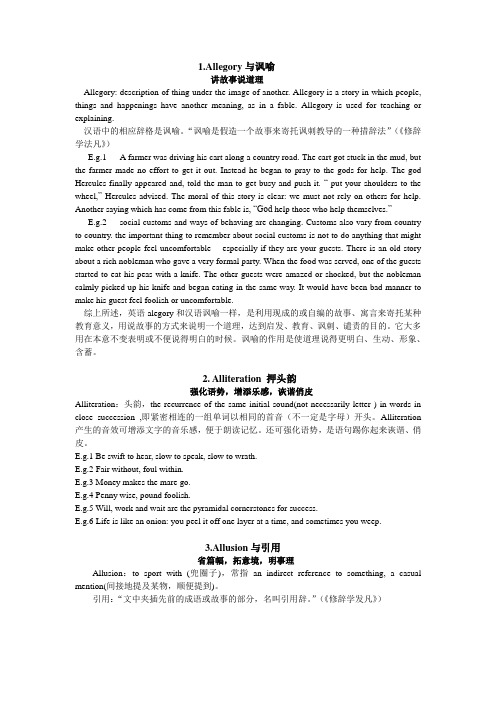
1.Allegory与讽喻讲故事说道理Allegory: description of thing under the image of another. Allegory is a story in which people, things and happenings have another meaning, as in a fable. Allegory is used for teaching or explaining.汉语中的相应辞格是讽喻。
“讽喻是假造一个故事来寄托讽刺教导的一种措辞法”(《修辞学法凡》)E.g.1 A farmer was driving his cart along a country road. The cart got stuck in the mud, but the farmer made no effort to get it out. Instead he began to pray to the gods for help. The god Hercules finally appeared and, told the man to get busy and push it. “ put your shoulders to the wheel,” Hercules advised. The moral of this story is clear: we must not rely on others for help. Another saying which has come from this fable is, “God help those who help themselves.”E.g.2 social customs and ways of behaving are changing. Customs also vary from country to country. the important thing to remember about social customs is not to do anything that might make other people feel uncomfortable----especially if they are your guests. There is an old story about a rich nobleman who gave a very formal party. When the food was served, one of the guests started to eat his peas with a knife. The other guests were amazed or shocked, but the nobleman calmly picked up his knife and began eating in the same way. It would have been bad manner to make his guest feel foolish or uncomfortable.综上所述,英语alegory和汉语讽喻一样,是利用现成的或自编的故事、寓言来寄托某种教育意义,用说故事的方式来说明一个道理,达到启发、教育、讽刺、谴责的目的。
英汉词语对比与翻译
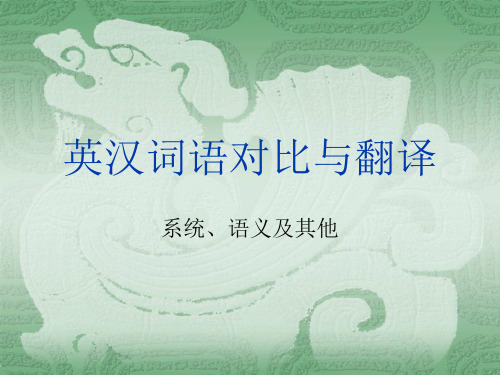
言内意义(intralingual meaning)或语篇意义是句子成分与 句子成分之间或句与句之间的关系,它决定着行文的韵律节 奏,如何衔接连贯,达到何种修辞效果等。
“三包”:包修、包退、包换
The three guaranteed R’s: repair, replacement and refund.
三个面向:面向现代化、面向世界、面向未来
Orient/gear educational work to the needs of modernization, the world, and the future
①She can be scornful of those ②who are not tough in either performance or philosophy, ③ reserving for them her ultimate pejorative, “wet”, ④which in her lexicon is an accusation of gutlessness.
三围
bust, waist and hips vital statistics 三资企业
Chinese-foreign joint ventures, cooperative enterprises and exclusively foreign-owned enterprises或 Sino-foreign joint ventures, cooperative businesses and exclusively foreign-owned enterprises in China
英汉对比与翻译

人到齐就开会。 The meeting will begin when all are here.
不要人云亦云。 Don’t say what others have said. Tense (时态)
帐单撕碎了。 The bill was torn to pieces.
问题解决了。 The problem was solved.
我们可以通过分析两种语言的差异,提高学生避免 或减少类推错误的意识,把负迁移(干扰)转化为正迁 移(促进)。
Part Two
A Contrastive Study of English and Chinese
英汉语对比研究
Difference Between
Comparative Study and Contrastive Study
在汉语中,名词和动词都没有形态变化。
Examples of Negative Transfபைடு நூலகம்r
3. Shanghai is said to have thirteen million population.
Collocation transfer (搭配迁移) The noun renkou, the Chinese equivalent of ‘population’, can have a numerical pre-modifier.
英汉 对比与翻译
English-Chinese Contrast and Translation
欢欢迎迎光光临临
左飚
English-Chinese Contrast and Translation
Zuo Biao
Part One
Native Language Transfer in FL Learning:
英汉句子比较与翻译

01
傅雷:东方人与西方人的思维方式有基本分歧,我人重综合,重归纳,重暗示,重含蓄;西方人则重分析,细微曲折,挖掘唯恐不尽,描写唯恐不周。
汉语学家王力:西洋语法是硬的,没有弹性;中国语法是软的,富有弹性。……所以中国语法以达意为主。 英国人写文章往往化零为整,而中国人写文章却往往化整为零。
1
2
3
5
这个问题必须予以处理。
6
This matter must be dealt with.
7
无被动助词
1
看似主动,但在主谓关系上却有被动含义,这种语言现象在汉语中大量存在。
2
例句:
3
那里讲什么语言?
4
What language is spoken there?
5
这个任务必须按时完成。
6
This task must be fulfilled in time.
There is nothing wrong with this computer.
这台电脑没有什么毛病。
2 –ible, -able 结尾的形容词作定语,与every, the only或形容词最高级连用来修饰一个名词时,也常需后置。 The doctors have tried every way possible. 大夫们已经试过各种可能的办法了。 They had the greatest difficulty imaginable getting there in time. 为了能及时赶到那儿,他们克服了极大的困难。 It is the only wild berry edible here in this area. 它是这个地区惟一能食用的野莓。
I worked very hard on this book.
Unit 2 英汉对比与翻译 (一)

1) Some Americans pop across the border simply to fuel up on (to add fuel, 原意为 “加燃料”,后引申为“吃喝,填肚子”) “加燃料”,后引申为“吃喝,填肚子”) flavorful Mexican food and beer. 2) You have to make up your mind as soon as possible. (make up). 3) Jack has become Jack of all trades and master of none. 4) Part-time barman wanted. Hours and Partsalary negotiable.
But, there's a problem - winters just aren't as cold as they used to be. Last year, Harbin had its warmest year since records began. And began. that means the city's famous ice sculptures are melting earlier. The ice festival traditionally lasts until the end of February. But this year, there are fears the ice will have melted long before then. And this is not just a worry for environmentalists. environmentalists. Harbin's ice festival is the city's biggest source of income. If the ice goes, so do the tourists. income.
英汉词语对比与翻译【打印版】
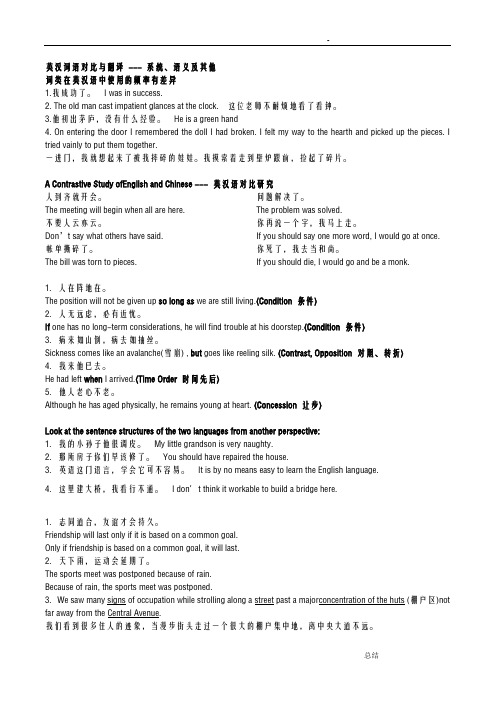
英汉词语对比与翻译--- 系统、语义及其他词类在英汉语中使用的频率有差异1.我成功了。
I was in success.2. The old man cast impatient glances at the clock. 这位老师不耐烦地看了看钟。
3.他初出茅庐,没有什么经验。
He is a green hand4. On entering the door I remembered the doll I had broken. I felt my way to the hearth and picked up the pieces. I tried vainly to put them together.一进门,我就想起来了被我摔碎的娃娃。
我摸索着走到壁炉跟前,捡起了碎片。
A Contrastive Study ofEnglish and Chinese --- 英汉语对比研究人到齐就开会。
The meeting will begin when all are here. 不要人云亦云。
Don’t say what others have said.帐单撕碎了。
The bill was torn to pieces. 问题解决了。
The problem was solved.你再说一个字,我马上走。
If you should say one more word, I would go at once. 你死了,我去当和尚。
If you should die, I would go and be a monk.1.人在阵地在。
The position will not be given up so long as we are still living.(Condition 条件)2.人无远虑,必有近忧。
If one has no long-term considerations, he will find trouble at his doorstep.(Condition 条件)3.病来如山倒,病去如抽丝。
英汉辞格对比与翻译
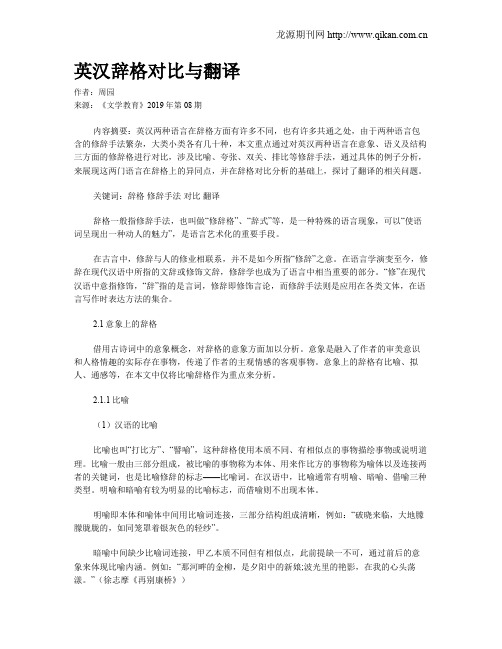
英汉辞格对比与翻译作者:周园来源:《文学教育》2019年第08期内容摘要:英汉两种语言在辞格方面有许多不同,也有许多共通之处,由于两种语言包含的修辞手法繁杂,大类小类各有几十种,本文重点通过对英汉两种语言在意象、语义及结构三方面的修辞格进行对比,涉及比喻、夸张、双关、排比等修辞手法,通过具体的例子分析,来展现这两门语言在辞格上的异同点,并在辞格对比分析的基础上,探讨了翻译的相关问题。
关键词:辞格修辞手法对比翻译辞格一般指修辞手法,也叫做“修辞格”、“辞式”等,是一种特殊的语言现象,可以“使语词呈现出一种动人的魅力”,是语言艺术化的重要手段。
在古言中,修辞与人的修业相联系,并不是如今所指“修辞”之意。
在语言学演变至今,修辞在现代汉语中所指的文辞或修饰文辞,修辞学也成为了语言中相当重要的部分。
“修”在现代汉语中意指修饰,“辞”指的是言词,修辞即修饰言论,而修辞手法则是应用在各类文体,在语言写作时表达方法的集合。
2.1意象上的辞格借用古诗词中的意象概念,对辞格的意象方面加以分析。
意象是融入了作者的审美意识和人格情趣的实际存在事物,传递了作者的主观情感的客观事物。
意象上的辞格有比喻、拟人、通感等,在本文中仅将比喻辞格作为重点来分析。
2.1.1比喻(1)汉语的比喻比喻也叫“打比方”、“譬喻”,这种辞格使用本质不同、有相似点的事物描绘事物或说明道理。
比喻一般由三部分组成,被比喻的事物称为本体、用来作比方的事物称为喻体以及连接两者的关键词,也是比喻修辞的标志——比喻词。
在汉语中,比喻通常有明喻、暗喻、借喻三种类型。
明喻和暗喻有较为明显的比喻标志,而借喻则不出现本体。
明喻即本体和喻体中间用比喻词连接,三部分结构组成清晰,例如:“破晓来临,大地朦朦胧胧的,如同笼罩着银灰色的轻纱”。
暗喻中间缺少比喻词连接,甲乙本质不同但有相似点,此前提缺一不可,通过前后的意象来体现比喻内涵。
例如:“那河畔的金柳,是夕阳中的新娘;波光里的艳影,在我的心头荡漾。
英汉对比

功。
the 2010 World Exposition.
Chinese Structure:
English Structure:
Topic-Comment 话题-评论 Subject-Predicate 主语-谓语
Contrast Between English and Chinese
Chinese
Once upon a time, there was a small village here. The village had ten households who all lived on fishing and farming. Their life was hard, but very peaceful.
Lacking inflection in the strict sense 缺少严格意义的 形态变化
老师们、同学们
我的爸爸、你的妈妈
认真的态度、 认真地学习
Retaining some inflections 保留一些形态变化
v.(动词): tense, aspect, voice, mood
n.(名词): number, case, gender
主语突出型语言
Chinese Order of Linguistic Elements 汉语语序(1)
• “不,他没去。” 玛丽说。
• “是的,他没 去。”玛丽说。
Chinese: bamboo-like sentence structure (竹式结构)
从前这里有一个小村庄,村里住 着十户人家,这十户人家全靠打鱼、 种地 为生,生活艰苦,但很安宁。
Once upon a time, there was a small village here. The village had ten households. The ten households all lived on fishing and farming. The life was hard, but very peaceful.
第2章 英汉对比与翻译
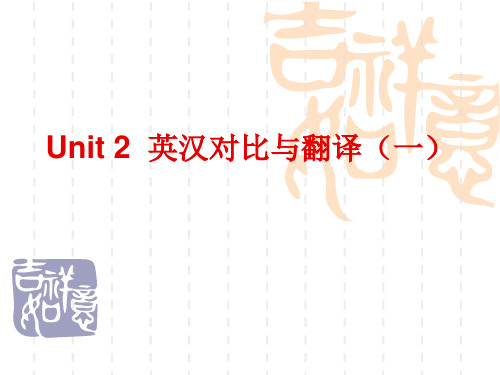
Conclusion:
8. 英语句子主语很少省略;汉语多用无主 语句。
主语在英语句子中的地位是不可动摇的, 除了祈使句、人物对话、说明书或某些特 殊实用文体中有时可省略主语,一般不使 用无主语句。
英译汉时许多英语句子的主语可以考虑省 略;汉译英时,则应力求主语到位。
例15
原句:As we lived near the road, we often had the traveler or stranger visit us to taste our gooseberry wine, for which we had reputation, and I confess, with the veracity of a historian, that I never knew one of them to find fault with it.
译文:It is funny that a beautiful girl like her should fall in love with such an ugly man.
Conclusion:
5. 英语前重心;汉语后重心
英语句子叙事往往是前重心,汉语则习惯 于后重心。
英语句子往往先说最近发生的事,再说先 前发生的事,基本按时间逆序展开;或者 先叙述事实,再说出其发生的时间、地点、 方式手段。汉语正好与此相反。此外,英 语句子往往先给出观点、结论、推断,再 加以论证;而汉语句子则习惯于先说事, 再总结,往往采用“前因后果”句式。
翻译时,为适应汉语行文习惯,英语的被动语态往往可 以考虑翻译成汉语的主动结构。另外,英译汉时,要尊 重汉语习惯,多使用动词或短语组句;多用流水句,少 用长句;多用人称主语,少用非人称主语;多使用主动 结构,少使用被动结构。
英汉辞格比较与翻译
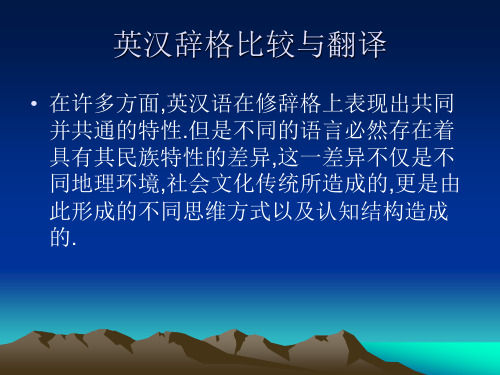
• 在英语中有大量的表示职业的“拔高词”, 即给原 本一些地位较低的工作安上一些好听的名称,如 footwear maintenance( 擦鞋匠), grief therapist( 殡葬承办人), sanitary engineer(清洁 工)
• Ambition is to life just what steam is to the locomotive.
• 壮志之于人生,其重要犹如蒸汽之于火车.
• If we haven’t got any money, we can’t buy a television. It’s as plain as the nose on your face.
• 改译: 他们水泄不通地拥挤在谢伯的篱笆前,由 于太吵了,你都听不见自己在想些什么.
Pun
• 英语的pun和汉语的双关相似,作为一种有趣 的语言现象,这类修辞往往运用词的多义或 异义和同音现象来取得幽默或讽刺效果.由 于英语和汉语的语音系统不同,所以英语的 谐音双关是很难直接翻译到汉语当中去的. 最好的办法是根据上下文翻译出作者的含 义.
• 当然,任何人,如果他认为在考虑艺术和修养问题之 前先得顾及生计问题,那么他并不理解艺术的意义 所在.
• At the mandarin Singapore, flagship hotel of Singapore mandarin International, we have long practiced service that is in tradition of emperors.
• 译文1:如果你允许,我要请你卷铺盖滚蛋了。谢 佛利太太,你久居国外,看来已经意识不到你自 己是在和一个英国绅士讲话。
英汉词语对比与翻译

(3)幽默(humor)、引擎(engine)
(4)保健(health protection)支部
(branch) 5.术语: 整数、分数、元素 6.特殊用语(1)敬语:“令”、“贵”、 (2)谦辞:敝、愚、小、拙 7.简称(1)抽取法:支部书记- 书记;科学 技术——科技
(2)标数法
英语表示人的后缀按附加的语义可分为这几类:
1,表示人的某种职业 -an historian -ant merchant -ar scholar -eer engineer -ist pianist -or author 2,表示具有某种职务 -ain captain -al principal -arch monarch -ary secretary 3,表示来自某个地方的人 -er villager -ese Chinese
汉语的字和词有区别:
单音节语素:实语素和虚语素 多音节语素
汉语词汇包括基本词汇和一般词汇
基本词汇:词汇的核心部分,发展过程中变
化最稳定、应用最广泛、构成新词能力最强 的那些词:天、地、山、水、年、门等。 一般词汇:1.古语词:天子、诸侯、尚书 2.新语词:克隆、计算机、网络 3.方言:二流子、母猪 4.外来词(1)咖啡coffee、尼龙nylon (2)卡宾枪(carbine)香槟酒 (Champagne)
4,表示信奉或信仰某种主义者 -an repulican -crat bureaucrat 5,表示做某种动作对人 -al rival
-ant/ent agent -ard laggard 6,表示感情色彩 -aster 带有“小、臭、丑”等轻蔑意味 Poetaster (大油诗人) criticaster 低劣的批评家 7,表阴性
英汉语对比与翻译

Comparison between English and Chinese vs. Translation
引子
There
isn’t much to live for in this jail of a house. He was open now to charges of willful blindness. 人不犯我,我不犯人。 我走在厚厚的地毯上,一点脚步声也没 有。 一匹马骑两个人。 他赢得起,输不起。 沉鱼落雁之容,闭月羞花之貌
3.
It
was a day as fresh as grass growing up and clouds going over and butterflies coming down can make it. It was a day compounded from silences of bee and flower and ocean and land, which were not silences at all, but motions, stirs, flutters, risings, fallings, each in its own time and matchless rhythm.
There isn’t much to live for in this jail of a house. (Charles Dickens) 住在这监狱一样的房子里,活着没有多大 意思。 My fool of a doctor told me to make my will. (John Galsworthy) 我那笨蛋医生叫我写遗嘱。
绿草萋萋,白云冉冉,彩蝶翩翩,
这日子是如此清新可爱;蜜蜂无言, 春花不语,海波声歇,大地音寂, 这日子是如此安静,然而并非安静, 因为万物各以其特有的节奏,或动、 或摇、或震、或起、或伏。
英汉对比词汇
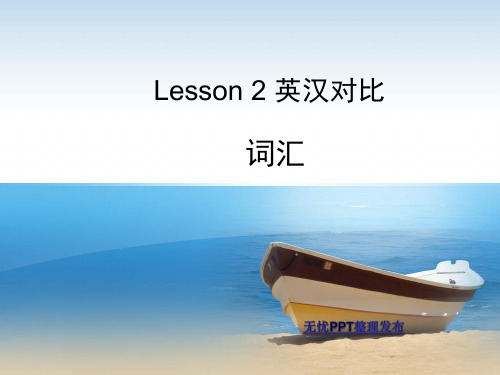
词汇
good –好的 a good Christian 虔诚的教徒 a good parent 慈爱的父母 a good child 孝顺的儿女 a good wife 贤良的妻子 a good husband 尽职的丈夫
• • • • • •
好—good 好教徒—a faithful Christian 好父母—a loving parent 好儿女—an obedient child 好妻子—a virtuous wife 好丈夫 —a dutiful husband
• 某些以-ible 或-able结尾的形容词用作定语时,与every ,the only,或形容词最高级连用来修饰名词时,也常放 在名词后 • We must help them in every way possible (every possible way). • 我们一定要用一切可能的办法来帮助他们。 • This is the only reference book available here. • 这是这儿能找到的唯一参考书。 • They are working to increase production at the highest speed possible. • 他们努力尽可能快的速度提高产量。
Hale Waihona Puke • “说” • 在不同上下文中可分别译成:“speak‖, ―tell‖, ―say‖, ―express‖, ―mention‖, ―persuade‖ 等等。 • 他说英语。 He speaks English. • 他说谎。 He’s telling a lie. • 他说他很忙。 He says he is busy. • 我说不好。 I’m unable to express. • 这可说不得。 It must not be mentioned. • 别胡说八道! Be reasonable!
- 1、下载文档前请自行甄别文档内容的完整性,平台不提供额外的编辑、内容补充、找答案等附加服务。
- 2、"仅部分预览"的文档,不可在线预览部分如存在完整性等问题,可反馈申请退款(可完整预览的文档不适用该条件!)。
- 3、如文档侵犯您的权益,请联系客服反馈,我们会尽快为您处理(人工客服工作时间:9:00-18:30)。
metaphor
• Metaphor is an implied comparison between two or more unlike things achieved by identified one with the other • Eg. 1. That lady tries to make sheep’s eyes at her new boss. • 那位女士想向新老板献媚. • Don’t show the white feather to the enemy. • 不要向敌人示弱. • He is a regular oyster. • 他总是守口如瓶. • There is a mixture of the tiger and the ape in the character of a Frenchman. • 虎恶猿狡的性格,法国人兼而有之.
euphemism
• Eg, If you will allow me, I will call your carriage for you. You have lived so long abroad, Mrs, Cheveley, that you seem to be unable to realize that you are talking to an English gentleman. • 译文1:如果你允许,我要请你卷铺盖滚蛋了。谢 佛利太太,你久居国外,看来已经意识不到你自 己是在和一个英国绅士讲话。 • 译文2:如果你允许,谢佛利太太,我要为你叫来 你的马车,请你走人,你已经在国外住的时间太 长,看来已经意识不到自己正在和一个英国绅士 说话。
• 1.Franklin Roosevelt listened with brighteyed smiling attention, saying nothing, and applauding heartily with the rest. • 富兰克林.罗斯福目光炯炯,满脸笑容,聚 精会神得听着;他没说什么,只是跟大伙儿 开心地跟大伙儿开心地鼓掌喝彩。 • 2.They talked to the foreign in hesitant English. • 他们用结结巴巴的英语同那个外国人交谈。
personification
• 英语的personification相当于汉语的拟人,都是运 用各种词汇,句法手法,把非人的事物人格化, 赋予各种物以人的言行或思想感情,即把人以外 的无生命之物或有生命之物当作人来描写。 • Hunger breaks stone walls. • 饥饿打破石头墙。 • 饥饿不饶人。 • Take time by the forelock. • 抓住时间的额发。?
• Mum, they told me that tomorrow I would get a job as the automotive internist. • 妈妈,他们告诉我明天我就可以得到一份当汽车内 科医生的工作。 • 在英语中有大量的表示职业的“拔高词”, 即给原 本一些地位较低的工作安上一些好听的名称,如 footwear maintenance( 擦鞋匠), grief therapist( 殡葬承办人), sanitary engineer(清洁 工) • Disgraced romeo minister admits to another secret daughter: Love Child No 2 for Yeo. • 译文1:不光彩的罗密欧部长承认又有一位秘密女 儿:约的第二号爱情之子。 • 译文2:名誉扫地的风流部长承认又有一位私生女: 与耶欧的第二个爱情结晶。
• Eg, He was as bold as brass to say such an impertinent thing to his professor. • 译文1: 他对教授说出如此不礼貌的话,真是脸 皮厚的像城墙拐角一样了. • 译文2: 他真是胆大包天,竟然对他的教授说出 这么无礼的话来. • He has been as drunk as a fiddler’s dog. • 他醉得像小提琴手的母狗.?? • 改译: 他烂醉如泥.
• • • • • • •
A man can no more fly than a bird can speak. 译文1: 比起鸟能说话,人不会更能飞. 译文2: 人不能飞翔,就像鸟不会说话一样. 试译: A word and a stone let go cannot be recalled. 一言既出,如同抛石,不能收回. Ambition is to life just what steam is to the locomotive. • 壮志之于人生,其重要犹如蒸汽之于火车. • If we haven’t got any money, we can’t buy a television. It’s as plain as the nose on your face. • 没有钱我们就不能买电视机.这就像秃子头上的虱子 ----明白的事.
• They swarmed up in front of Sherburn’s palings as thick as they could jam together, and you couldn’t hear yourself think for the noise. • 改译: 他们水泄不通地拥挤在谢伯的篱笆前,由 于太吵了,你都听不见自己在想些什么.
• Eg 3, He can be as obstinate as all the donkeys on Dartmoor when he pleases. • 他耍性子时,固执得像达穆的所有驴子. • 驴子在汉语中也是具有 “倔强的比喻,所以译 文2保留了原文的喻体是妥当的.像这类的说 法还有 • As busy as a bag of fleas 像一袋虱子般忙碌 • As cross as nine highways 像九条高速公路 一样交叉着 • As meek as a maid 温柔如少女 • As dumb as an oyster 像牡蛎一样缄口不言
• At the mandarin Singapore, flagship hotel of Singapore mandarin International, we have long practiced service that is in tradition of emperors. • 新加坡文华大酒店乃新加坡文华酒店的佼佼者. 在此,我们长期实行的一整套服务都体现皇家风 范. • The sun sets regularly on the United Jack these days, but never on the English language. • 改译: 太阳定期地照着杰克工会,但从来没有照 到过英语语言. • 现在英国已不再是 “日不落”的国家,但是,英 语却广泛流行使用着.
Transferred epithet
• 英语transferred epithet 这一修辞格,相当于汉语的“移 就”,即“将原描写甲事物性状的修词语移来描写相关的 乙事物。”,最常见的是把应用来描写人的定语用来描写 物。 • 1. I buried my head under the miserable sheet and rug, and cried like a child. • 译文1:我把头埋在悲惨的被单和摊子下面,像孩子样哭 了起来。 • 译文2:我非常难过,一头扎进被单和毯子,像孩子一样 哭了起来。 • 2. The old man lay all night on his sleepless bed. • 老人整夜躺在那不眠的床上。 • 老人躺在床上,彻夜未眠。
英汉辞格比较与翻译
• 在许多方面,英汉语在修辞格上表现出共同 并共通的特性.但是不同的语言必然存在着 具有其民族特性的差异,这一差异不仅是不 同地理环境,社会文化传统所造成的,更是由 此形成的不同思维方式以及认知结构造成 的
simile
• Simile refers to a direct comparison between two or more unlike things, normally introduced by like or as. • 英语和汉语在比喻的运用上具有共性,如 numberless as the sands, as hungry as a wolf, as rapid as lightening, as light as a feather”等.但也存在着差异,有些差异甚至 无法在汉语中再现.
hyperbole
• Hyperbole就是故意运用夸大事实的手法来 加以强调,以求给人突பைடு நூலகம்的印象. • 英汉语言中的夸张不乏酷似之例,如 to hang by a hair ,money makes the mare go, burst one’s sides laughing
• Eg,1 I did not cry, I could not. My cheeks were as hot as fire and my very eyes burnt in my head. • 译文1: 我没有哭,我哭不出来.双颊热得如火, 眼睛在头上燃烧. • 译文2: 我没有哭,我哭不出来.双颊热得火辣 辣的,两眼好象在冒火. • He ran down the avenue, making a noise like ten horses at a gallop.
metonomy
• 英语的metonomy和汉语的借代都是用一种名称 代替另一种名称, 给事物换一个名称,一求语言新 鲜别致,生动形象,其心理基础也是联想. • Surely anyone who thinks that the question of art and cultivation must go before that of the knife and fork does not understand what art means. • 当然,任何人,如果他认为在考虑艺术和修养问题之 前先得顾及生计问题,那么他并不理解艺术的意义 所在.
